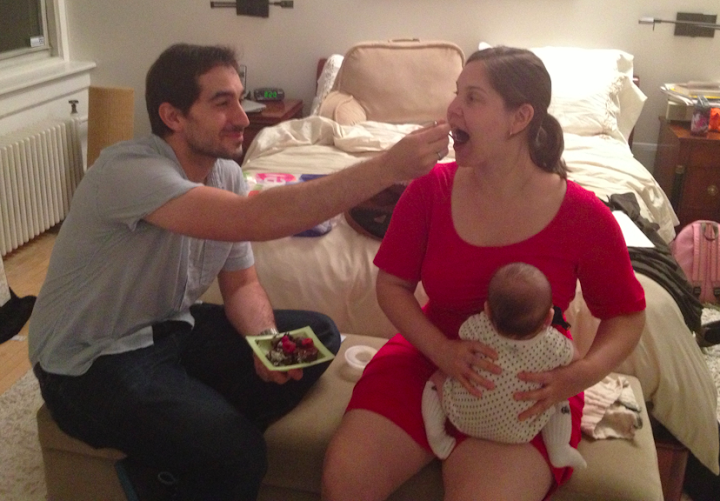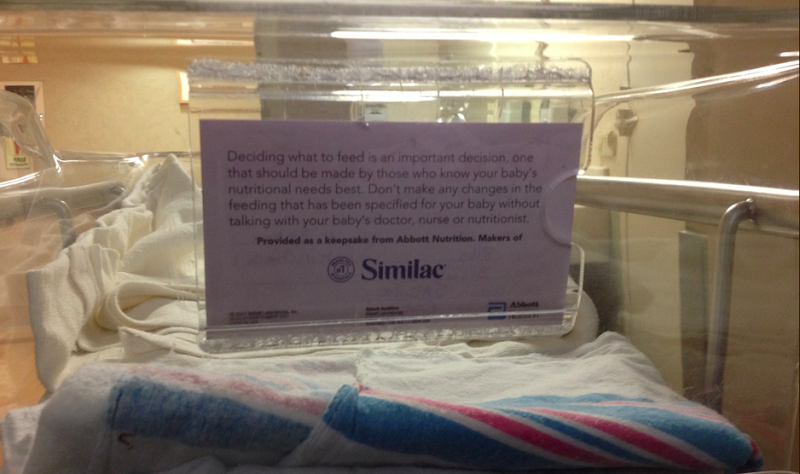Here's an interesting piece over at Scary Mommy about what sounds like a vicious cycle: a child is born and her mom is eager and enthusiastic and perhaps a bit worried about getting “everything right.” She googles and reads about Everything, and, with a lot of work, becomes, eventually, more confident and super competent! She has lists and Techniques and Methods and they work. Yay, right? She’s a little controlling about it, but oh well, whatever, right?
Except that, according to Melissa Lawrence,years later, she ends up with her life like this on a typical Saturday:
Time to head out? Mommy crouches down tying all the shoe laces while Daddy catches up on the iPad because Daddy doesn’t get the kids ready because he doesn’t know all the ins and outs. Mommy hands Daddy the bag with the change of clothes, lunch and the water bottles. The kids are firing questions at Mommy and she’s fielding them like a catcher during bating practice. “Can I do this?” “Why did he get that?” It’s only 9 a.m. and you’re so drained from the excess of planning, details and decision-making that you’re ready to head back to bed.
She’s basically imprisoned in kid-minutiae, alone with it, because, as Melissa puts it, she has “trained [her partner] not to make any decision whatsoever regarding the kids.”
Well, crap.
But before you’re like, “damned if I do and damned if I don’t” about it, I think there’s a lot more to it.
First, there are a lot of different ways women grow into motherhood — not everyone has the same experience. Melissa advises that to prevent this scenario, moms should,
Get the hell away from that baby and let Daddy do his messy, sloppy, imperfect, thing.
But: For some women, even people who are usually pretty easygoing, part of the learning curve is a period where she simply is … how to put it gently? … impelled to do everything and Extremely Controlling. It makes sense, when you think about it — the baby is a bunch of mysteries at first. For many of us, every little mystery that is resolved is like a hard-won, intoxicating gift — if doing something results in a sleeping baby, or a baby who stops crying, damn right you’re going to do it every time. And you probably should, for now, because your sanity is a major ingredient in your family’s well-being.
And if you’re, perhaps, be a smudge curmudgeonly when someone else starts to do it wrong? You know, we’re all human. Try not to be obnoxious, really do try. But honestly, you’re entitled to a few grumpy moments when you’re getting used to your life being turned on its ear.
This Controlling Thing isn’t a “problem,” it’s normal for lots of new parents, especially while the kid is still a baby. Many, many new moms get enormous satisfaction and pride out of being the one who “can” respond to the baby! And for others, they may simply find it very satisfying or irresistible, for now, to “do everything.” If this is where you are, it’s right for you for now, even if it’s unlikely you’ll love or need this much control in a few years. (BTW, if you are handling everything and *not* finding it satisfying or irresistible, but are, instead, annoyed/resentful, then foist some of that shizzle upon your partner (see below)! But for now, I’m talking about moms who find it, temporarily, OK).
I don’t think you grow out of the temporary new mom desire to Control by being told that it’s going to ruin your life later if it goes on and on. You know what does help you grow out of it?
- Time. In time, you notice that if someone forgets to pack wipes in your diaper bag, you can pick some up while you’re out and it’s a hassle, but it’s not the apocalypse. Try to notice this stuff. Then you start to ease up. And likewise,
- Experimentation. (Here Melissa and I agree) — when you can, let others take a turn, even if you know it will make a mess, take longer or potentially disrupt your balance. This is how others learn why you do what you do, and it’s how you find new things that also work, and it’s how you learn you don’t have to do everything. This is important; you should do it. But do it when you can. Don’t experiment when you’re not ready just because you’re afraid that five years from now your life will be bad. Don’t experiment on a day where you’re already in tears mid-morning about how chaotic life is. And if every day feels too chaotic to experiment with anything, though, you probably also need:
- Company, friendship, fresh air, and food. If you’re being well taken care of, there are a whole host of things that will bother you a million times less and you will be able to play with this more. I promise. And, relatedly
- A Partner who shows you he or she wants to be in there with you however works for your family now (more about this below).
If your baby is still basically a blob, and you’re basically doing everything and that’s working for you for now, take it easy on yourself.
Second, though, and here’s what really bothers me about the article. Can we just, collectively as a world decide not to use the word “trained” to describe what goes on in human relationships (except if we’re really joking or reading like Fifty Shades or something)? Yes, we all respond to praise and try to avoid chastisement, but I hope there is more to your relationship with your partner than just a carrot stick situation.
The truth is that a parent who wants to get in there, get his hands dirty and be, truly, a co-parent will do it, even if the other parent is a Bossy Beeyotch for years, even if her inherent personality is very controlling.
I say this not just as someone who has seen it professionally but as a Bossy Beeyotch myself. From a long line of Bossy Beeyotches (my mother calls us a “Family of Generals”; my cousin literally has a post-it on her computer with a little message reminding her to “Ease the Fuck UP!” which has, alas, not transformed her character). Bossy Beeyotches, all, we nevertheless all have partners who are full parents. I did not say “perfect” parents or “perfect” marriages. But all of our kids know that Dad can pack a lunch, arrange a playdate or hold your head when you’re barfing, even if he and Mom don’t do it the same way. Why? Because (a) it’s not fucking rocket science to do those things and (b) they wanted in. Not in the same way, not on the same timetable, not like clones of us, and it wasn’t always beautiful or easy to negotiate. But they got in there because they wanted to.
My point is this: if you’ve got a bunch of kids and you’ve been doing the parenting thing for a while now, and Dad is taking a pass on all the daily crap of involvement, this is not because “mom is too controlling” and certainly not because she went through the normal new-mom controlling Thing. It is because Dad isn’t trying to work with her.
If he’s saying, to himself, “she’s controlling, moody, difficult,” perhaps these are all true, and she ought to work on her tone. Really, she should. But it doesn’t end there. Concluding that he ought to retreat into the Ipad and not bother to figure out how to make the kids’ lunch because Mom can be difficult? That is not the logical conclusion. This is the person you’re sharing your life and raising children with. If you want a relationship with your partner, you work with her. If you want a relationship with your children as a full parent, you get in there and find something you can do.
Being in the game can mean finding something the mom needs less control of and taking that on — because you want to do this. Or it can be the simple statement, “I want to watch you and learn even if you’re doing it for now.”
Even if it’s the early months and mom simply wants (or needs!) to handle many things herself, the simple expression, “I want to understand; I want to be in it” is so important and such a show that you are part of a growing family. And from mom: even the simplest expression that “I value your opinion and perspective” is team playing.
It’s not a woman’s responsibility to train her husband, for good or for bad. He’s a dude, not a dog, and you are partners. No relationship is easy. But that’s why we do this as adults.
Go for it w/ your partner. When you’re working together — whatever form that takes for now in your parenting adventure — it feels good.




